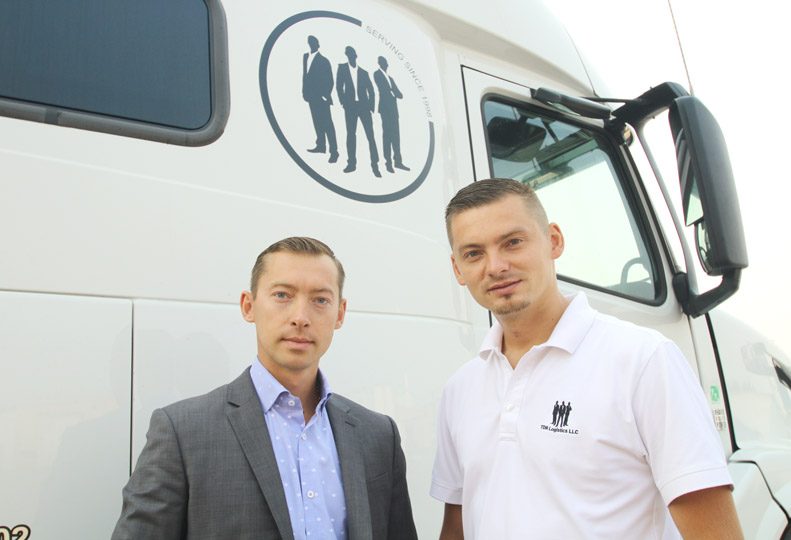
Home » TDR Logistics on pace for record haul this year
TDR Logistics on pace for record haul this year
Ukrainian brothers take company to new heights

August 17, 2017
The three-son second generation of ownership at West Plains-based TDR Logistics LLC says the company is experiencing unprecedented heights in terms of sales and activity.
The company’s average, gross monthly revenue in 2017 so far has been $1 million, and its earnings have been aided by relatively affordable fuel costs, says Dmitriy Oberemok, who oversees logistics for the company. That compares to average, gross monthly revenue of about $800,000 last year.
“At the pace where we are, this year is going to be a record year for the company,” he says.
Dmitriy, Timofey, and Roman Oberemok took over the business eight years ago after their father, Nikolay Oberemok, retired from the company.
The family immigrated to Spokane from their native Ukraine in 1997. Nikolay founded TDR Logistics the following year.
TDR Logistics has the ability to perform most supply chain operations for its customers, including shipping and delivery, Dmitriy Oberemok says.
“Where do you ship, and when do you ship … we can offer and broker out all those needs,” he says. “We have a strong network of business partners in place to be able to contract out what we may not have or be able to provide.”
With 14 acres of land and an abundance of warehouse space, TDR Logistics also generates income charging for storage on its secured premises, he says.
The company is located at 3009 S. Geiger Blvd., north of Interstate 90 just east of the Geiger exit. TDR Logistics operates out of a 14,000-square-foot office space and a total of 16 buildings with 54,000 square feet of warehouse and storage space, says Dimitriy Oberemok.
The brothers share equal ownership of the business. While Dmitriy oversees logistics, Roman handles advertising and marketing. Tim, who is in Ukraine on business for the rest of the year, is in charge of maintenance.
The company has customers across the country, but the majority are in the Inland Northwest. Oberemok lists Spokane Valley-based Kaiser Aluminum Inc., West Plains-based Pearson Packaging Systems, and West Plains-based Triumph Systems Inc. as being among the company’s largest clients.
“Pearson Packaging is now a 10-year customer, and I estimate that we probably ship as much as 90 percent of their products,” Oberemok says.
To accommodate growth, TDR Logistics recently spent $1.6 million on 10 new semi trucks, which will give the company a total of 70 semis. TDR’s drivers cover the U.S.—including Alaska—and Canada, Oberemok says.
TDR Logistics averages between 115 and 120 employees depending on the time of year. Approximately 60 workers are long-haul drivers and are employed both full and part time. Another 25 drivers are independent contractors who work with the company. Most other employees are mechanics and dispatchers, Roman Oberemok says.
“I think the best way to say it is that more than 100 people receive a paycheck from us in some form,” he says.
Oberemok says the company, a five-minute drive from Spokane International Airport, is situated in an ideal location.
“We’re just minutes away from the airport and rail lines and are a 5 1/2-hour drive from the Port of Tacoma,” he says. “We can get it (product) to (the) dock so our customers can focus on what they do best.”
In an effort to recruit and retain quality and experienced drivers, TDR Trucking tries to limit long-haul travel for its drivers to seven to nine days followed by three days off.
“Over-the-road is hard work. Most of the time drivers are gone between two weeks to a month with maybe a day or two off if they’re lucky,” he says.
“I believe our schedule is a great thing we provide for our drivers and a strong selling point to come and work for us,” he says.
He says some independent contractors lease semis from TDR Logistics if they own their own trailer. Oberemok says the company recently helped two of its former full-time drivers secure funding for their own semis because those drivers wanted to start their own business.
The brothers say watching their father helped influence the way they lead, manage, and operate the business.
“He was an entrepreneur who wanted to help other people become entrepreneurs, even it meant they might become a competitor business,” Roman Oberemok says.
Latest News Up Close
Related Articles



